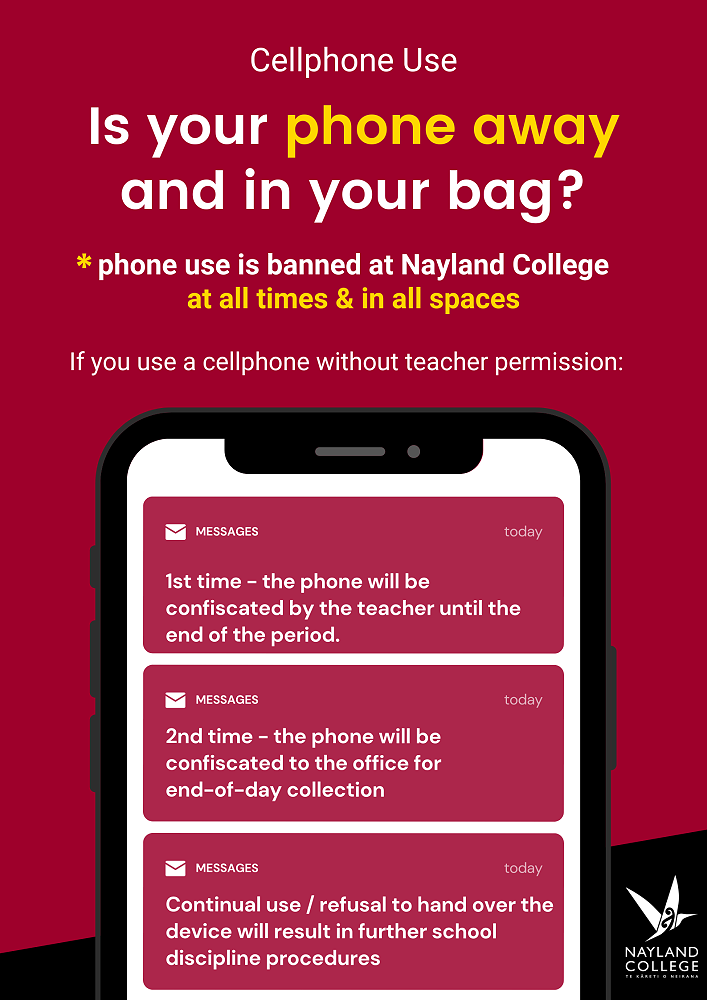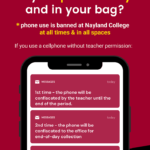In line with a government directive, we are strengthening our rules around cellphones. Please read carefully…
Smartphones provide a multitude of conveniences and handy tools. However they also come with some downsides – social media can put huge pressures on young people, and we have certainly seen an increase in online bullying over recent years. We have also noticed that young people are finding it increasingly difficult to disconnect and manage their phone use. They have become a significant distraction.
It is with this in mind, along with the new Government’s nationwide school cellphone ban, that we are letting our students and community know we will be adhering to, and supporting, the phone free school policy in 2024. The aim is to promote focus, reduce distractions, and enhance student engagement in the classroom.
What does this mean for students?
-
Your phone will need to be away (preferably off) in your bag before you arrive on school grounds.
-
You will need a laptop for any digital / online work – a phone will not be an acceptable device for everyday learning.
-
You will not be allowed to use your phone during the school day (between 8.50am-3.15pm), including at break times.
-
Teachers may occasionally give permission for phones to be used for a particular activity (e.g. making short films in Media Studies), and in these instances, whānau and students will be communicated with in advance.
-
If you need to contact a parent, or they need to contact you, this can be done through the student support centre.
Other FAQs:
How will this policy be enforced?
The policy will be communicated clearly to students and parents. Teachers and staff will remind students to adhere to the policy, and any violations will be handled following the school’s disciplinary procedures.
What about educational use of cell phones?
The policy doesn’t restrict educational use. Students can use school-provided devices (such as laptops) under teacher supervision for specific educational purposes. Exceptions may be made for special activities such as the film-making example above.
Will there be exceptions for special circumstances?
The school will consider exceptions on a case-by-case basis for unique circumstances or diverse health or learning needs, working closely with parents to find appropriate solutions.
How will this policy impact after-school activities?
The policy primarily applies during instructional hours. After-school activities may have different guidelines, and the school will communicate these separately.
What support will the school provide to help students adjust to this policy?
The school will offer guidance to both students and parents about the policy, its benefits, and strategies to adapt. Additionally, teachers will integrate alternative technologies or methods for classroom activities where necessary.
Steps for confiscation and consequence:
1st time phone out:
-
Confiscation to teacher’s desk. [Teacher makes Kamar entry]
-
Kaiarataki (Dean) contacts home to remind about phone and confiscation policy.
2nd time phone out:
-
Confiscation to teacher’s desk. [Teacher makes Kamar entry]
- Kaiarataki / Deputy Principal collects the phone and puts it in the safe in the student support centre. Student may collect this at the end of the day.
- Kaiarataki contacts home to remind the caregiver that if there is a 3rd time, the phone will need to be collected from school by them (not the student).
3rd time phone out:
-
Confiscation to teacher’s desk. [Teacher makes Kamar entry]
- Kaiarataki / Deputy Principal collects the phone and puts it in the safe in the student support centre.
- Kaiarataki contacts home.
- Caregiver (not the student) must collect phone from student support centre.
Please note that this policy will be in place from the first day of term one. Thank you for your support and understanding.
Ngā mihi nui,
Hannah Banks
Acting Principal
By Hannah Banks


